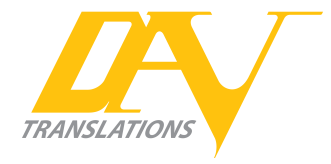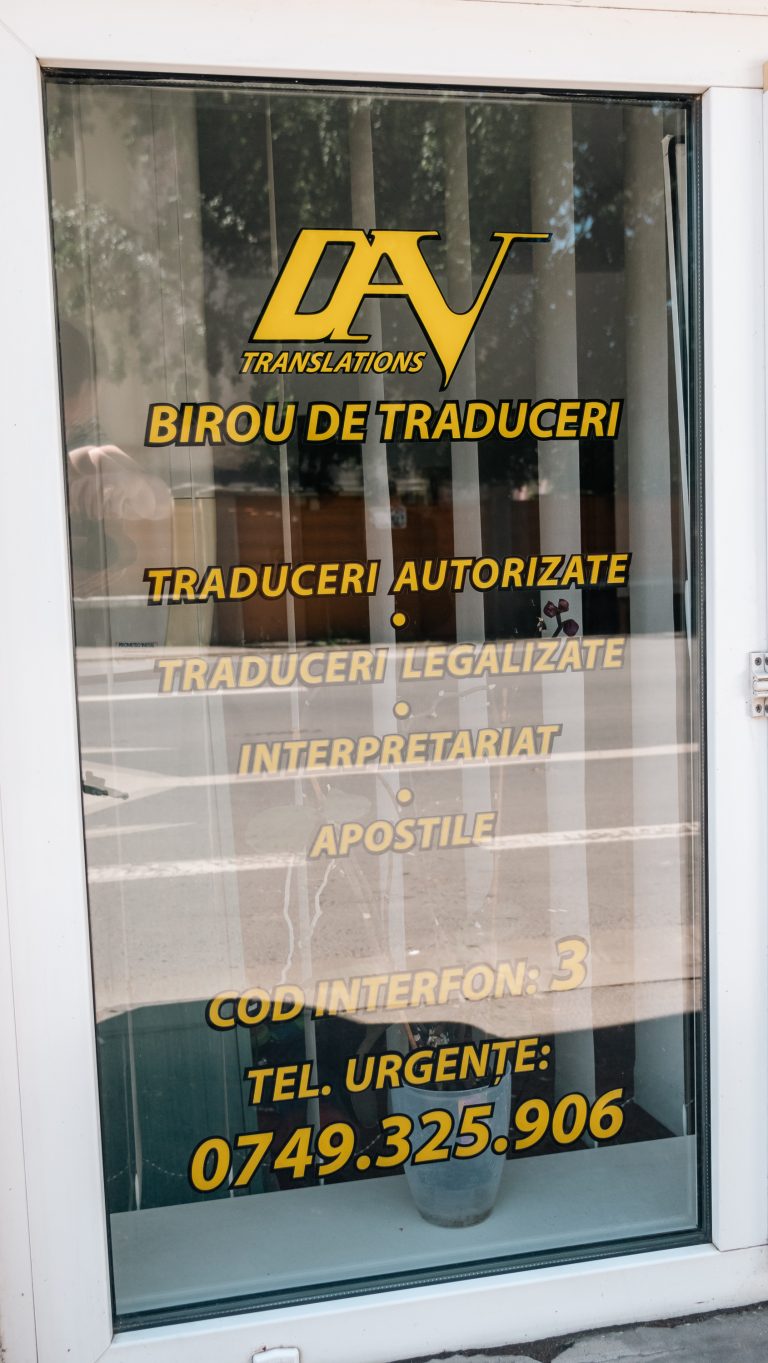what we offer
translation
types of translation
Sworn translations
- The translation is performed by a translator certified by the Romanian Ministry of Justice or by the Romanian Ministry of Culture, who, at the end of the translation, attaches the translator’s certification, signs and affixes his/her stamp. Mainly, this type of translation is requested by state institutions, courts, hospitals and other domestic of foreign medical centers.
Authenticated or notarized translations
- The authenticated translations requires that the translator’s signature is authenticated by a notary public. When the translation is completed and prepared for authentication by the notary, the translator presents himself/herself to a notary public office to authenticate the translation. Translators can only authenticate their translations at notary public offices where they have submitted the certificate issued by the Romanian Ministry of Justice and the specimen signature. This type of translation involves additional costs and is mostly requested for civil status documents, study documents, documents drawn up by a notary public etc.
Apostille translations
- The translation that has the apostille attached is the translation authenticated by a notary public which subsequently undergoes the apostillation/superlegalization procedure, depending on the country where it is used. The apostille or superlegalization is attached at the end of the authenticated translation, on a separate page, by the Chamber of Notaries from the city/region where the translation was performed. This type of translation involves additional costs and a somehow longer deadline. Apostille translations are requested by international institutions.
Fields we have been working with up to the present:
Technical
HVAC and air conditioning
Civil and industrial engineering
Automotive
Energy sector
Biogas and waste management
Safety data sheets
Onboarding and handling procedures in airports
User manuals for pumps, agricultural machines, elevators, cranes and overhead travelling crane
Medicine and pharmacy sector
User manuals of medical devices
Patient information leaflets
Medical referral letters and discharge summaries
Education
Study documents
Internal regulations and rules, operational procedures for universities
Legal and commercial:
Civil verdicts, judgements, notary deeds
Laws, regulations
Commercial contracts, confirmation of company details, articles of incorporation
Human resources
Employment contracts
Ethical codes, internal rules and instructions for multinationals
Marketing: product catalogues, flyers, product presentations
Transport: driver training courses, vehicle handover-receipt protocol, regulations on maritime transport, access and merchandise loading rules
IT: user guides for IT equipment, user interfaces, SQL documentation
Vehicle selling contracts and related documents, other standard documents and forms.
We suggest that you contact us even if you need assistance with a translation that does not necessarily belong to one of these categories. We are open when it comes to new challenges and willing to improve. We will for sure find a viable solution to your need.
Interpreting
Interpreting is an oral or verbal form of translation. It is often used in the economic and legal fields, tourism, medical and real estate. Interpreting means that the interpreter has to travel to the place where the meeting or conference is held.
There are two types of interpreting: consecutive interpreting and simultaneous interpreting. Consecutive interpreting takes places when the speaker takes frequent breaks in his/her speech, after 2 or 3 phrases, in order to give the interpreter enough time to translate for the other participants in the meeting. It is usually used for smaller business meetings, for training courses, at the bank, at the notary, at the Civil Status Office, in court.
Simultaneous interpreting is necessary when large events take place and the number of participants is higher, such as conferences, symposiums, product presentations etc. Interpreters translate in real time what the speaker says. A special technical equipment is needed. This type of interpreting is very challenging and requires a very high concentration, that is why interpreters work in teams of 2.
Should you need an interpreter to accompany a person who does not speak Romanian to a state institution, to the bank, notary office, physician’s office or to translate at conferences, trainings etc., we are able to help.
REVISION
Revision means that once the translation is completed, a reviser checks it in order to make sure it was correctly performed and that it fits the purpose agreed. The translated text is carefully reviewed to see if it was translated in full, if the meaning of the source text is the same with the target text, if there are any grammar, spelling or expression mistakes, if figures, tables, names are correctly inserted; in short, the reviser ensures that the translation complies with a certain quality standard.
That is why no translation leaves our office without being carefully revised, either it is a text that we translated or it is a translation performed by another translator for which the customer requests an additional revision.
Romanian language courses
As we all have noticed, there is a high number of foreign citizens coming to Romania to set up a business, to study or work or who find a Romanian life partner and decide to come and live in our country. Therefore, we have decided to make things easier as far as language services are concerned and give them the opportunity to study Romanian language. Should you decide to learn Romanian in order to communicate with other persons in your everyday life, at the workplace, at various institutions etc., we are the right choice. The courses are held at our office, a quiet, nice and easy-to-find location in the center of the city.
Foreign language courses
We offer English and French language courses for adults who wish or need to learn a foreign language at the workplace, as a hobby, or who have decided to immigrate and intend to speak fluently the language of the country of destination.
Courses are divided on three levels:
beginner
intermediate
advanced
Groups are made up of 1 or 2 persons.
At the end of the course, you will be able to speak the language studied fluently, no emotional roller coaster. You will feel more confident and at ease when forced to have a conversation in the foreign language you studied.
Should you need or want to obtain a national or international language proficiency certificate, we can put you in touch with the appropriate accredited institutions.

